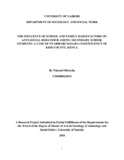| dc.description.abstract | Cases of secondary school students indulging in anti-social behaviours and aggressive
tendencies have been occurring and the blame has been on the influence of family and
school-based factors. Against this background, the main objective of the research was to
determine the influence of family and school based factors on anti-social behavior among
secondary school students in Nyaribari Masaba Constituency in Kisii County. The specific
objectives of the study were i) to determine the prevalence of anti-social behaviors among
secondary school students. ii) to investigate whether there is any relationship between forms
of family variables and anti-social behavior. iii) To assess if there is any relationship between
forms of school-based variables and anti-social behavior, and iv) to establish whether
inconsistencies between school and family variables lead to anti-social behaviour. The study
adopted the social learning theory and social control theory. Methodologically, the study
applied a descriptive survey research design and targeted secondary school students, where
the target population for the study was 41 secondary schools in Nyaribari Masaba
Constituency in Kisii County. A sample of 120 respondents from 10 schools were sampled
and while questionnaires to were used to collect quantitative data, while a key informant
interview guide was used to collect qualitative data. In data analysis, the study used SPSS
version 20 programme to analyse quantitative data, while qualitative data derived from openended
questions was grouped into various thematic areas and presented in narrative approach
together with the presentation of quantitative data. Analysis of the collected data established
that lack of counselors in schools, inadequate parental care, peer influence, media influence,
and broken homes as critical predicators of anti-social behaviours among secondary students.
Moreover, the study revealed that poor parental discipline, family conflict between parents
and children, parental attitudes condoning problem behavior, and family conflict between
parents as family related variables that influence anti-social behaviour. Further, the analysis
of the collected data indicated that school year, school climate, peer pressure, and inadequate
guidance from teachers as some of the school-based factors that influence anti-social
behaviour and that school and family play distinct roles in regulating behaviour. The study
recommends that management of schools should offer guidance and counselling to school
and should encourage parents/guardians to monitor the behaviour of their children. In
addition, the study recommended that heads of schools should develop a monitoring
framework that tracks behavioral changes in students, parents should regulate the home
environment in a way that supports all-round development of children, and this involves
setting of rules and offering guidance and counselling. | en_US |



